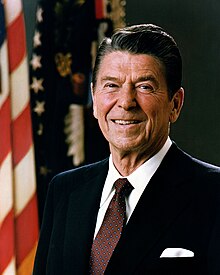📖 Presidential Profile
Comprehensive overview of leadership, policies, and historical significance
📋 Biography & Political Journey
Hollywood Career and Early Politics
Ronald Wilson Reagan was born on February 6, 1911, in Tampico, Illinois, and grew up in a working-class family. After graduating from Eureka College, he worked as a radio broadcaster before moving to Hollywood in 1937. Reagan appeared in over 50 films during his acting career, though he was never a major star. He served as president of the Screen Actors Guild and initially held liberal political views, supporting Franklin Roosevelt and opposing McCarthyism before gradually shifting to conservative positions during the 1950s.
Governor of California and Rise to National Prominence
Reagan entered politics in the 1960s, delivering a famous speech supporting Barry Goldwater in 1964 that launched his political career. He was elected Governor of California in 1966, serving two terms and implementing both conservative fiscal policies and surprisingly moderate social policies. He challenged Gerald Ford for the Republican nomination in 1976 and won the presidency in 1980, defeating incumbent Jimmy Carter in a landslide by promising to restore American confidence and economic prosperity.
Economic Policies and Cold War Leadership
Reagan implemented supply-side economic policies known as “Reaganomics,” featuring significant tax cuts, deregulation, and reduced government spending on social programs. His administration oversaw a period of economic growth, though it also led to increased income inequality and federal deficits. In foreign policy, Reagan took a hardline stance against the Soviet Union, calling it the “Evil Empire” and launching a military buildup that many credit with helping end the Cold War. He later developed a productive relationship with Soviet leader Mikhail Gorbachev.
Iran-Contra and Controversial Decisions
Reagan’s presidency was significantly damaged by the Iran-Contra affair, a secret operation that involved selling weapons to Iran and using the proceeds to fund Nicaraguan rebels, violating congressional prohibitions. The scandal led to multiple prosecutions and raised questions about Reagan’s management style and knowledge of his administration’s activities. His administration also faced criticism for its delayed response to the AIDS crisis, with Reagan not publicly mentioning AIDS until 1985, and for policies that many argued worsened urban poverty and the war on drugs.
The Great Communicator and Memorable Moments
Reagan earned the nickname “The Great Communicator” for his skilled use of television and his ability to connect with ordinary Americans. His presidency included several memorable moments, such as challenging Gorbachev to “tear down this wall” at the Brandenburg Gate, and his folksy humor that endeared him to many Americans. During the 1984 debates, when questioned about his age, the 73-year-old Reagan quipped, “I will not make age an issue of this campaign. I am not going to exploit, for political purposes, my opponent’s youth and inexperience.” He survived an assassination attempt in 1981, joking to his wife Nancy, “Honey, I forgot to duck.”
Humor & Jokes
Reagan's Pompadour
Ronald Reagan's hair was so perfectly styled, it had its own Secret Service detail and…
Read More →Greatest Wins
💰 Economic Recovery Tax Act and Supply-Side Economic Reforms
Reagan's tax cuts and deregulation policies helped end stagflation and sparked robust economic growth throughout…
Read More →Epic Fails
🩺 Delayed Response to AIDS Crisis
Reagan largely ignored the AIDS epidemic for years, failing to address a public health crisis…
Read More →